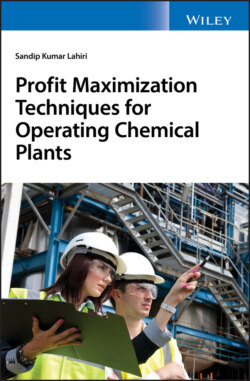Читать книгу Profit Maximization Techniques for Operating Chemical Plants - Sandip K. Lahiri - Страница 32
1.4 Need for Profit Maximization in Today's Competitive Market
ОглавлениеDue to globalization today CPIs have to compete with the global competitive market. The raw material costs of refinery and petrochemicals are varying along with the global crude oil price. Crude oil prices are unpredictable and depend on many complex geo‐political parameters of OPEC and devolved countries. As raw material cost comprises a major component of the product price, profit margins of refineries and petrochemical companies vary in tune with the crude oil price. The final product price of polymers and downstream chemicals are also varying with the crude oil price but the amplitude of variations is not the same as the crude price. Some of the major challenges faced by CPI today are as follows:
Middle East companies (especially those in Saudi Arabia, Qatar, UAE, etc.) and those of China are building plants of world scale capacity, which therefore minimize their production costs. Eight of 10 of the world's largest refineries or petrochemical plants are situated in the Middle East countries or China.
Cheap raw material costs of Middle East companies make them so competitive that companies in other countries find it difficult to compete with them.
Companies have to operate in a global market (both purchase and sales) due to rapid globalization where there are no trade barriers.
Cheap manpower costs of China and SEA companies make them cost effective.
CPI has to fulfill more and more stringent pollution control norms imposed by local pollution control authorities.
Discovery of cheap US shale gas and the building of mega sized refineries and petrochemical factories in the US will change the business map of global competition in the near future as major oil and chemical demands of the US will be satisfied by US companies themselves. This will reduce US demands from China and OPEC countries.
The US may very soon drastically reduce their oil import from OPEC countries and rely on their own oil production. This will change the global oil demand pattern as the US is the major oil importer from Saudi companies. This new oil demand supply equation will affect the crude oil price in an unprecedented way, which may lead to uncertainty in the global crude oil price.
The recent trade war between the US and China will make the polymer and chemical pricing and demand supply scenario uncertain as it evolves.
A faster gross domestic product (GDP) growth rate of the world's top two biggest countries, China and India, will increase demands for polymer and oil, which may shift the global demand pattern into the Asia region in the near future.
Today's CPI has to operate under all of the above uncertain scenarios. Unless it finds an effective mechanism to optimize all the resources that are under its direct control and maximize its profit, it will not generate enough cash to prepare it to deal with uncertain product prices and uneven global competition.
Companies need to be flexible in their product pattern and should have the capability to increase or decrease capacity in tune with global demand. For that companies need to have enough extra cash in hand so that they can use it as a buffer to respond to global business uncertainties.
Implementation of an effective profit maximization project is the only way to generate this buffer money and strategically position the company in a better way to sustain their operation amid global business uncertainties.
